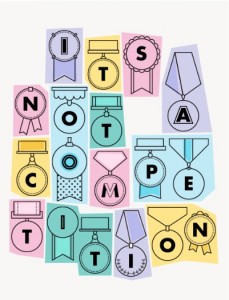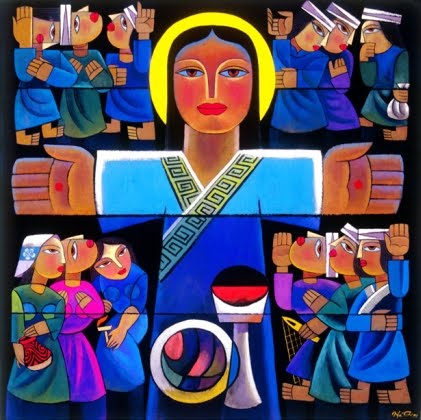Mark 9:30-37
Who is the greatest Christian you have ever known?
Who is the best Christian you can think of?
I want you to take a moment, and think about that.
Get that name or a picture of that person in your brain … everybody have somebody?
Are you as good a Christian as that person?
Do you measure up to the person that you have locked in your brain?
 Ken Follett wrote a book two decades ago called The Pillars of the Earth. In this book, which is a novel of the building of cathedrals in England, there is a stonemason who has an idea on how to build a cathedral. He’s pretty confident that he knows how to build what we now call flying buttresses, but he’s not certain that he can do it as well as they are doing it in France.
Ken Follett wrote a book two decades ago called The Pillars of the Earth. In this book, which is a novel of the building of cathedrals in England, there is a stonemason who has an idea on how to build a cathedral. He’s pretty confident that he knows how to build what we now call flying buttresses, but he’s not certain that he can do it as well as they are doing it in France.
So he goes to the abbot, and he says to the abbot, who is a wise man, “Do I have to be the best there ever was? What if my gift isn’t as good as someone else’s?”
The abbot looks at him and says, “You don’t have to be the best there ever was. You have to be the best that you can be.”
My friends, you don’t have to be as good a Christian as that saint I’m confident you each thought of.
You have to be as good a saint as you can be.
Because if you are doing the best that you can do, at any given moment … if in any given moment, you give your best, and it’s pretty darned good, God will look at you and say, “Well done, good and faithful servant.”
And if the best you have to give is really pretty bad, but it’s still the best you have to give, at that given moment? God will look at you and say, “Well done, good and faithful servant.”
Because you tried.
You don’t have to be the best Christian there ever was to walk the earth.
You have to be as good as you can be, in that given moment.
• • •
Jesus is walking along, teaching his disciples, explaining to them a little more of what he has already told them – that he is going to have to go up to Jerusalem, he’s going to be arrested, he’s going to be tried, he’s going to be beaten, he’s going to be executed, and on the third day, he will be raised from the dead.
Now, he’s just gotten done telling them this. And Peter – gosh, good beloved Peter, who gets it and never gets it, in the exact same moment, Peter, who is so good at this, says, “No, no, Lord! You can’t go and do this.”
Jesus has just finished saying to him, “Get behind me, Satan, you’re thinking of earthly things instead of heavenly things.” Now he’s walking along, teaching his disciples, they get to Capernaum, they go into a house, and Jesus says to them, “So, what were you all talking about behind my back?”
They don’t want to tell Jesus, because you know what they were talking about behind his back?
“I’m better than you!”
“Oh, no, I’m a better Christian than you are,” – OK, they weren’t using the word Christian in those days, they were saying, “Oh, no, no, I’m a better disciple than you are. I want to sit at the right hand of God.” “No, no, me!”
They were like a bunch of squabbling little kids!
They’re fighting behind Jesus’ back. They’re not concentrating on being the best they could be in any given moment, they’re concentrating on who is going to get the glory!
And Jesus says to them, “No, no, no. You don’t get it. It’s not a competition!”
Being a follower of Jesus is not a competition!
Trust me, my friends, if you are keeping score, God’s going to have something to say to you. When you get to the pearly gates, the first thing God is going to do is rip up your scorecard!
Because being a Christian is not about being better than anybody else at it. It’s about you reaching deep inside yourself, and being the best that you can be at any given moment.
As I said, some days, those efforts are going to be glorious, and God is going to smile upon you … and some days, those efforts are going to stink, and God is going to smile upon you.
Because you tried.
You don’t have to be the best there ever was.
You have to be the best that you can be.
Mahatma Gandhi once, when talking about Christianity, said that he thought Christianity was a marvelous religion; it was a really great religion. And that the tenets of Christianity were incredible! The problem was, he said, he’d never really met anybody who lived them. He’d never really met a good Christian.
And that’s what our problem is.
We get so wrapped up, sometimes, in competing with each other that we forget that it’s not a competition.
Being a good Christian is not about topping the guy next door or the guy down the street. We are not better than the Methodists down Braddock Road. We’re not. The good news is, they’re not any better than we are! It’s kind of a draw.
It is about how we can live our lives faithfully every moment of our lives.
• • •
How many of you have stood in a checkout line at the grocery store, where there’s a little old lady … who’s taking forever to get her checkbook out … I’m not talking about writing the check, I’m talking about when everything has been rung up and she hasn’t gotten the bloody checkbook out yet … and you’re standing in line, and the Redskins are coming on in, oh, 22 minutes, and it’s going to take you 18 minutes to get home … if this lady will get out of your way! Right? And you can feel the tension rising … and while she’s looking for her checkbook, she’s having a little chat with the lady who’s checking her out, and saying, “Oh, I can’t find this.” We’ve all been through this situation, and the tension is rising, and your blood pressure is going up, and you really are getting mad …
Has it dawned on anybody, that for this woman, this is the most human contact she is going to have in any given day? And she is stretching it out … because this is her human contact? Because when she goes home, there’s nobody who is going to call her, and nobody who is going to visit her?
Would it kill us as Christians to reach out and have a conversation with the woman, to greet her?
That’s what it means to be a Christian.
I’m not talking about the big, bad stuff that could happen to you.
I’m not talking about going out and being the best there ever was.
I’m not talking about you going and changing the world all at once.
And I for darned certain am not talking about you saving the world. That’s been done. About 3 o’clock in the afternoon, outside the gates of Jerusalem. It was a Friday, 2,000 years ago. The world’s already been saved, folks. It’s not on our shoulders.
All Jesus asks us to do … is to be faithful … every moment of our lives.
When we’re driving on 495 … and it’s rush hour … we sin more in our cars than we sin anywhere else in our lives! I am convinced of it! (Except at 11 o’clock on Saturday mornings, when we’re all listening to Wait, wait! Don’t tell me! and we’re driving along the road, laughing like hyenas, because it is so funny.) The rest of the time, on 495, during rush hour, we are all getting … tense … and we’re saying bad words, and we’re calling people bad names … right? Everybody has done this? I cannot be the only person …
Take that time, right then and there, to stop and think, Is this what God really wants me to do? Is this what it means to follow Jesus? To call people names?
I got really upset one day, when I was zipping home from this neck of the woods. I now live over in Falls Church, so the best thing to do is to go down 236, get on 495 North, zip around 495 North to 66 East, get off at 66 East, go one exit, to 7, and then I’m a mile and a half from home. Right? Piece of cake. Easy-peasy, 18 minutes, 20 minutes in normal traffic.
All of the sudden, the exit comes up – and you know, they’ve redone the exits for 66, east and west, off of 495 – and I have to slam on my brakes, because no traffic is moving. We start inching our way and inching our way, and I’m thinking to myself, “All right, hold it together. As soon as you get to 66 East, these are all people who want to get on 66 West.”
Well, I go to get on 66 East, and what happens but there’s a cop car, and he has blocked the entrance. The reason we are all slowed down is not that 66 West is slow, it’s that all of us, all three lanes of us who have been trying to get on 66 East and 66 West together, were now going west.
I ended up having to get on 66 West, and go farther out than where I had started, to get off the highway, to zip around, to get on the highway to go back.
I … was … livid!
I was such a bad person that day! I was so upset. I really was.
There was nothing on the news about this. There was nothing to tell us what was going on, no signs, no nothing.
I kept fuming, “Couldn’t you tell us about this?”
Well, when I finally get on 66 East, and I go blitzing past the exit I should have taken earlier, almost an hour before, I saw a really bad traffic accident.
They had to do an airlift to take someone to the hospital …
… and I felt awful.
I had been so concerned for myself that I had not once thought that maybe, just maybe, there had been an accident, and that someone’s life was in the balance.
In all that time driving, I never once thought about being the best that I could be – because all I cared about was me.
My friends, trust me, this was not a moment when God smiled upon me and said, “Well done, good and faithful servant.”
But if … if … each of us were to think about offering our best, especially in those times when we don’t want to offer our best, the world would be a far better place.
It would be such a good place that we could change the world.
 As long as we remember: This is not a competition.
As long as we remember: This is not a competition.
We don’t have to be the best there ever was.
We simply have to be the best that we can be …
Every single moment of our lives.
Amen.
Sermon preached on the 17th Sunday after Pentecost, Proper 20, at the Church of the Good Shepherd, Burke, Va., on 23 September 2012.








